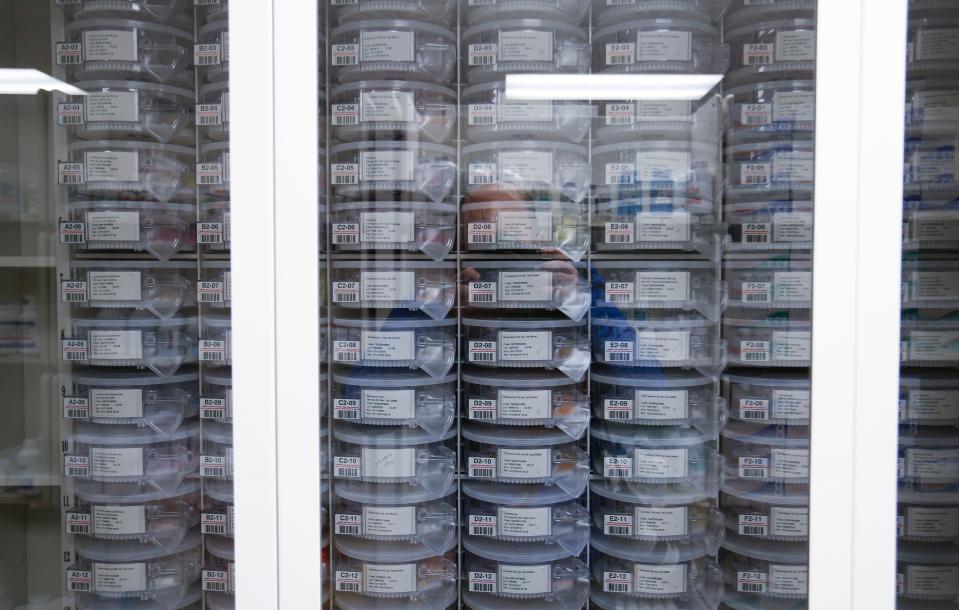MO lawmakers take aim at insurance policies that penalize patients who use drug coupons
JEFFERSON CITY — Medication for Nora Ancel and her sons doesn't come cheap.
The Pleasant Hill mother of three and two of her children all have a rare bleeding disorder that prevents proper blood clotting. The medicine to treat their illness is one of a kind and has no generic alternative, costing upwards of $10,000 per person per year.
For years, Ancel told Missouri lawmakers Monday, her family was able to take advantage of assistance programs that reduced their deductible and out-of-pocket expenses for the treatment. But in 2018, their insurer began enforcing a policy that prevented those assistance programs from applying to their expenses — shocking their family budget and eventually forcing them to refinance their home.
"The wording was very hidden in the policy and it was very coded, so we really didn't know what was going on," Ancel said. "We had to go through leaps and bounds to figure out why it was occurring."

Pharmaceutical manufacturers and nonprofits across the U.S. often create the assistance programs to lower the burden on patients, particularly those with rare illnesses who require unique drugs that are, as a result, exceedingly expensive. In response, some insurers have created what are called "copay accumulators" — which prohibit the assistance programs from contributing to deductibles and out-of-pocket expenses, forcing the patient to cover the costs on their own.
"We feel the insurance companies are double dipping when they do this," Ancel said. "They're getting the money from the copay assistance and then requiring us to pay it yet again."
Proposed legislation by Rep. Dale Wright, a Republican from Farmington, would require insurance companies to include any amount "paid on behalf of the enrollee," such as from those assistance programs, when determining how much money a patient must pay out-of-pocket.
"This is a bill about fairness toward our citizens," said Wright. "I'm sure it feels like I'm at war with insurance companies. I am not. I'm just trying to advocate for our citizens back home and make sure they have fairness in their pharmaceuticals and in their health care."
Sixteen other states, including Arkansas and Illinois, have passed similar laws limiting or banning insurers from using accumulator policies.
More:Education bill restricting how schools can teach race, history advances in Missouri Senate
Insurers call for different solutions, while advocates support legislation
Representatives from insurance providers and associations echoed a common sentiment during a hearing on the legislation: there was an easier solution right in front of them.
"Ask that manufacturers lower prices (on drugs)," said Sean Stephenson, a lobbyist representing the Pharma Care Management Association. "If they can offer a coupon, they can probably make a price concession somewhere."
Shannon Cooper, a lobbyist representing a group of insurance providers and Blue Cross Blue Shield in Kansas City, called the bill "confusing and no one really understands it," arguing that "nobody knows" where the assistance money ends up going.
"We can just rip this bill up," he said.
Supporters of the legislation disagreed. The vast majority of the drugs addressed by these insurance policies, they argue, have no generic alternative and are expensive because the patient pool is so small. Manufacturers are unlikely to lower prices anytime soon.
"It's not like 'oh, we just want you to take Drug X instead of Drug Y," said David Winton, a lobbyist representing Burrell Behavioral Health based in southwest Missouri. "There is no Drug Y. There's one drug."
Bridget Tyrey, the executive director of the St. Louis-based Gateway Hemophilia Association, called the practice by insurance companies "discriminatory," pointing to data that shows patients who face high out-of-pocket costs often don't use their dosage correctly, or sometimes don't renew their prescriptions at all.
"This insurance trend will continue to impact more Missourians if we do not pass reform now," Tyrey said.
Galen Bacharier covers Missouri politics & government for the News-Leader. Contact him at gbacharier@news-leader.com or on Twitter @galenbacharier.
This article originally appeared on Springfield News-Leader: MO bill limits insurance policies raising out-of-pocket drug prices

